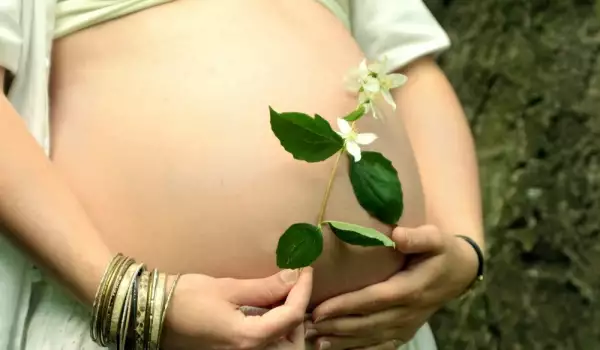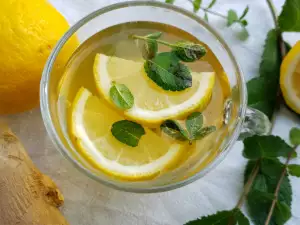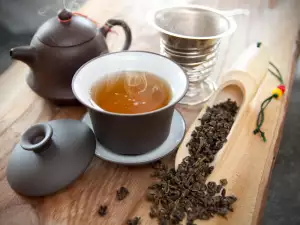During pregnancy women have many questions about what they can and cannot do. It is important that they know what tea to drink during pregnancy (especially if they like to make it) and which one can be dangerous in this situation.
As a general rule, pregnant women should consult their physician about the consumption of products that they are not aware of how they will affect them and the baby. But still, we will try to introduce you to dangerous teas during pregnancy.
Classic tea during pregnancy (black, green, pu'er, etc.)
If you like to drink black tea, you should remember that it contains caffeine and the norm of this substance for a pregnant woman is 200-300 mg per day. Of course, no one carries a special tea calculator in their pocket and calculating exactly how much caffeine you get with each cup is quite difficult.
That is why it is better to brew black tea weakly (by steeping for 10-15 seconds) or diluted with more water (if you prefer this method of preparation). The same rules apply to those who like to drink green tea as well as white, yellow tea, oolong and pu'er. There is no less caffeine in these types of tea than in classic black (and even more in matcha).
General medical advice for healthy women comes down to the advice not to drink more than 3 cups of plain tea made from the leaves of the tea bush. Caffeine can easily cross the placenta and the baby's immature liver has a hard time breaking it down. This way, infants are more likely to experience side effects from amounts of caffeine that would be considered safe for adults. It's important to remember that caffeine is also found in many sodas, chocolate, cocoa, and coffee itself. Therefore, when measuring for yourself the permissible amount of tea, think about other products that you consume per day.
Herbal teas during pregnancy

Although it is generally accepted that herbal teas are more beneficial for pregnant women than the classic ones, this is actually a very controversial issue. As with traditional tea leaves, a pregnant woman should use any herbal drink in moderation, as even the safest plants in large quantities can harm the baby. But there are also many herbs that are absolutely contraindicated in pregnancy.
Usually, some plants from which tea is prepared increase the tonicity of the uterus and can lead to miscarriage. Others may make the pregnant woman more excitable, which is also not recommended. And others can directly harm the development of the fetus.
Dangerous herbs for pregnant women
- Basil, which is often found in Mediterranean cuisine, is not prohibited in small quantities in the composition of foods, but its use in herbal preparations should be avoided;
- Chamomile activates the ovaries, which increases the level of estrogen, which contributes to an increased tonicity of the muscles of the uterus;
- Parsley causes contractions of the uterus, which can cause premature birth;
- Lavender, thyme, juniper, yarrow, fennel seeds, nutmeg, cloves, primrose, aloe juice, nettles, raspberry leaves are able to actively stimulate the uterus and cause miscarriage;
- Arnica, capsella, tansy - increase blood flow to the pelvic organs, which can provoke an abortion in the presence of predisposing conditions;
- Anise, clover, fenugreek, licorice, sage, hops, alfalfa - shift the hormonal balance towards a predominance of estrogen, which leads not only to physical, but also to psychological problems in pregnant women;
- Ginger, lavender, greater celandine, yarrow - have a shrinking effect on the uterus in large quantities;
- Onions, peppers, aloe, Echinacea - the recommendation to limit consumption is related to the ability to cause disruption of the normal functioning of the stomach during pregnancy. Aloe also stimulates intestinal motility, causing diarrhea.
- Aloe, rhubarb, sea buckthorn, castor oil, senna - these plants are known for their laxative effect. The organic compounds contained in them cause a rush of blood to the uterus, which negatively affects the pregnancy.
- Eleutherococcus, radiola, Chinese lemongrass are not recommended for pregnant women due to the peculiarities of their action: they stimulate the nervous system and increase blood pressure.
- Viburnum - has a uterine activity stimulating property. Viburnum fruit, teas and fruit drinks based on them lower blood pressure. This negatively affects pregnant women with already low blood pressure, which is common in the first trimester. It is not recommended to use viburnum with increased blood clotting and tendency to thrombosis.
- St. John's wort, sage and medicinal hyssop can disrupt placental blood circulation and lead to oxygen starvation of the fetus;

- Licorice root and Chinese magnolia, hops, anise, corn hair can lead to increased nervousness and headaches in pregnant women;
- Ginseng, artemisia, valerian, dandelion, wild rosemary and red clover - worsen the toxicity and negatively affect the intrauterine formation of the fetus, in extreme cases leading to the appearance of anomalies and malformations.
- Swamp mint. This is the only type of mint that is strictly prohibited for pregnant women. It contains a highly toxic substance, and the use of mint tea stimulates uterine bleeding. Be careful with other types of mint as well. Almost every type of mint contains essential oils, which is not very good for the expectant mother.
The list of prohibited teas for pregnant women also includes all herbs that are toxic and should be used with caution even in the absence of pregnancy. They are not usually used for everyday tea, but can still be included in any herbal tea blend.
General rules for drinking tea during pregnancy
- avoid making strong teas;
- refrain from adding various spicy and aromatic spices to the tea;
- do not drink tea from herbal mixtures with many components - there will always be an inappropriate herb or combination;
- in the first trimester, it is not recommended to take any combined herbal teas, as all the organs and systems of the baby are being formed.
Always drink herbal tea after consulting your attending physician. Follow the recommendations and dosage prescribed by them, since they know your pregnancy history and health best.
Note that there are many mechanisms of herb penetration into the placenta and even sometimes the components themselves are not fully known. Doctors themselves are very skeptical of herbs, so it is necessary to clearly understand and calculate the possible risk, if necessary.
















Comments